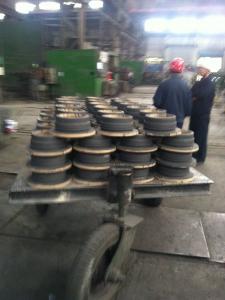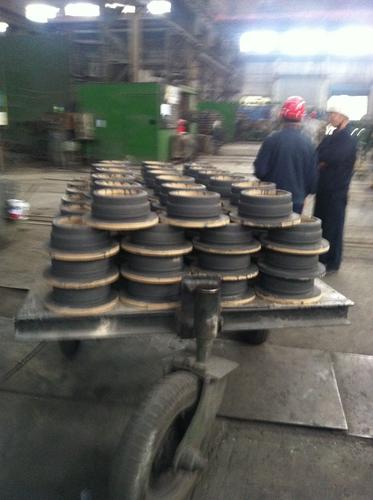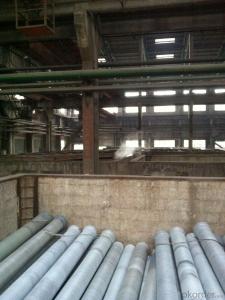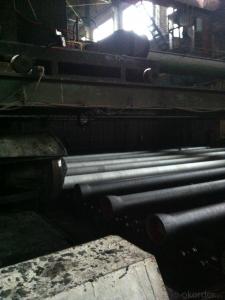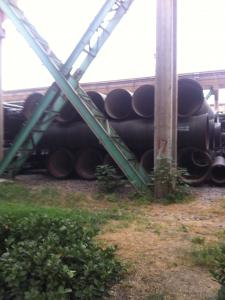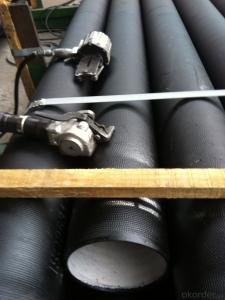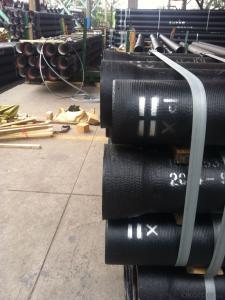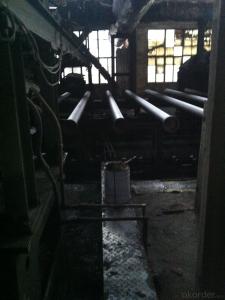DUCTILE IRON PIPES AND PIPE FITTINGS K9 CLASS DN450
- Loading Port:
- Tianjin
- Payment Terms:
- TT OR LC
- Min Order Qty:
- 22 pc
- Supply Capability:
- 3000 pc/month
OKorder Service Pledge
OKorder Financial Service
You Might Also Like
Material : Ductile Cast Iron
Size Range : DN 80mm to DN 2000mm
Unit Effective Length : 6m or 5.7m
Manufacture Standard: ISO 2531:1998/ EN 545:2006/EN 598:2007
Annual capacity : 200,000 tons
Coating Exterior: Zinc 130g/m2 according to ISO 8179-1 and bitumen coating 70 microns.
Cement Interior: Portland Cement/ High Alumina Cement/ Sulphate Resisting Cement Lining according to ISO 4179
Special requirements on external coating and internal lining can be applied
We also provide accessories such as SBR/EPDM rubber gaskets, lubricant paste, pipe caps, PE sleeves, etc.
Additional Parts:
Each pipe is strictly inspected according to related standard to ensure permanently high performance.
Easy Installation at site and service free for life
Long Service Lifespan
Quotation will arrive you within 24hours once we get your inquiry.
We guarantee offering you a competitive price.
A copy of original inspection reports of pipes will be offered after shipment.
Photos of loading process will be sent to the customer after shipment effect.
We will follow-up the delivery progress after shipment effect and update to the customer on weekly basis.
- Q: Can ductile iron pipes be used for pressure relief systems?
- Indeed, pressure relief systems can make use of ductile iron pipes. Renowned for their robustness, longevity, and capacity to endure intense pressure circumstances, ductile iron pipes possess a remarkable resilience against both internal and external pressures. Consequently, they prove to be ideal for deployment within pressure relief systems. Furthermore, ductile iron pipes can withstand considerable fluctuations in pressure without jeopardizing their structural integrity. Consequently, they find widespread usage in various settings necessitating pressure relief systems, including water supply networks, wastewater treatment facilities, and industrial operations.
- Q: How do ductile iron pipes handle dynamic loads?
- Ductile iron pipes possess remarkable strength and durability, enabling them to effectively manage dynamic loads. These pipes exhibit a high resistance to bending and can endure the pressure and stress exerted on them when exposed to dynamic loads, such as water hammer or ground movement. The distinctive composition of ductile iron, which includes a small amount of carbon and the addition of magnesium, produces a structure that is both robust and flexible. This combination allows the pipes to flex when impacted by dynamic loads, rather than fracturing or breaking like other materials. Moreover, ductile iron pipes demonstrate a superior impact resistance, enabling them to absorb and distribute the energy generated by dynamic loads throughout their structure. This capability to dissipate energy effectively minimizes the risk of pipe failure and ensures the longevity of the pipeline system. Additionally, ductile iron pipes exhibit excellent stress distribution properties, ensuring that the load applied to the pipes is evenly dispersed along their length. This feature serves to prevent localized stress concentrations and reduces the likelihood of damage or failure. To summarize, ductile iron pipes are specially designed to handle dynamic loads with utmost efficiency. Their strength, flexibility, impact resistance, and stress distribution properties make them highly suitable for applications where dynamic loads are a concern, guaranteeing the reliability and longevity of the pipeline system.
- Q: Can ductile iron pipes be used for underground irrigation systems?
- Yes, ductile iron pipes can be used for underground irrigation systems. Ductile iron pipes are commonly used in various applications, including water supply and distribution systems. They are known for their strength, durability, and resistance to corrosion, making them suitable for underground installations. Additionally, ductile iron pipes have excellent pressure-bearing capacity and can withstand the high pressures often required for irrigation systems. However, it is important to ensure proper installation and maintenance to prevent any damage or leaks in the system.
- Q: Are ductile iron pipes resistant to corrosion?
- Yes, ductile iron pipes are resistant to corrosion. Ductile iron is a type of cast iron that has been treated with additional materials to make it more flexible and durable. These materials, such as graphite, magnesium, and cerium, create a protective barrier on the surface of the pipe, making it highly resistant to corrosion. Additionally, ductile iron pipes are often coated with a layer of cement mortar or a fusion-bonded epoxy coating, further enhancing their resistance to corrosion. This makes ductile iron pipes suitable for use in various applications, including water distribution, wastewater treatment, and industrial pipelines, where corrosion is a common concern.
- Q: Can ductile iron pipes be used for conveying gases?
- Yes, ductile iron pipes can be used for conveying gases. Ductile iron has excellent mechanical properties and is resistant to corrosion, making it a suitable material for transporting various types of gases. Additionally, ductile iron pipes are known for their strength and durability, making them a reliable choice for gas transmission systems.
- Q: How does ductile iron pipe perform in corrosive environments?
- Ductile iron pipe is well-known for its exceptional performance in corrosive environments. It has proven to be highly resistant to corrosion due to its unique composition and protective coatings. The primary factor contributing to its resistance is the presence of graphite nodules, which act as a barrier against corrosive agents. These nodules effectively inhibit the spread of corrosion and provide a protective layer for the iron pipe. Additionally, ductile iron pipes often undergo several external coatings and linings to further enhance their resistance to corrosion. These coatings, such as cement mortar lining or epoxy coatings, provide an additional layer of protection against corrosive substances. They create a barrier between the pipe and the surrounding environment, preventing the corrosive agents from reaching the iron surface. Furthermore, ductile iron pipes are highly durable, which adds to their performance in corrosive environments. They have a long life expectancy and can withstand high-pressure conditions, making them suitable for various applications. The inherent strength of ductile iron makes it less susceptible to damage, even in harsh environments. It is important to note that while ductile iron pipes exhibit excellent resistance to corrosion, the specific performance can vary depending on the nature and concentration of the corrosive substances present. In extremely aggressive environments, additional protective measures such as cathodic protection or sacrificial anodes may be required to ensure long-term durability. Overall, ductile iron pipe has a proven track record of performing exceptionally well in corrosive environments. Its unique composition, combined with external coatings and linings, make it a reliable choice for applications where corrosion resistance is crucial.
- Q: Are ductile iron pipes resistant to chloride-induced corrosion?
- Yes, ductile iron pipes are generally resistant to chloride-induced corrosion due to their protective coating and inherent chemical composition. However, the level of resistance may vary depending on the specific environment and concentration of chlorides present. Proper maintenance and regular inspections are still important to ensure long-term durability and prevent any potential corrosion issues.
- Q: What are the typical joint restraint requirements for ductile iron pipes in seismic zones?
- In seismic zones, the typical joint restraint requirements for ductile iron pipes are designed to ensure the structural integrity and prevent displacement or separation of the pipes during seismic events. These requirements are crucial to maintain the reliability and functionality of the pipeline system. One common joint restraint requirement for ductile iron pipes in seismic zones is the use of flexible or mechanical joint systems. Flexible joints, such as rubber gasket joints, can absorb and accommodate the movement caused by seismic activity. These joints allow for axial movement, angular deflection, and expansion/contraction of the pipes, reducing the risk of pipe failure or damage. Another important requirement is the use of adequate anchoring systems. This involves securing the pipes to the surrounding structures or embedding them in concrete thrust blocks to prevent excessive movement or displacement during seismic events. Anchoring systems help distribute the forces generated by the earthquake and minimize the risk of pipe separation or breaking. Additionally, seismic design standards often require the use of seismic restraints, such as seismic joint restraints or bracing systems, to further enhance the stability and integrity of the ductile iron pipes. These restraints are designed to limit the movement of the pipes in specific directions, reducing the potential for damage and maintaining the overall system performance. It is important to note that the specific joint restraint requirements for ductile iron pipes in seismic zones may vary depending on local building codes, seismic activity levels, and engineering considerations. It is crucial to consult the relevant regulations and work with experienced professionals in the design and installation process to ensure compliance with the necessary requirements for seismic resistance.
- Q: What are the different corrosion protection options for ductile iron pipe?
- There are several corrosion protection options available for ductile iron pipe to ensure its longevity and durability. These options include: 1. Cement Mortar Lining: This involves coating the inner surface of the pipe with a layer of cement mortar, which acts as a barrier between the pipe and corrosive elements in the water or soil. Cement mortar lining provides excellent corrosion resistance and can last for several decades. 2. Polyethylene Encasement: This method involves wrapping the ductile iron pipe with a layer of polyethylene material. The polyethylene acts as a physical barrier, protecting the pipe from external corrosive elements. Polyethylene encasement is commonly used in aggressive soil conditions and can offer long-lasting protection. 3. Internal and External Coatings: Various types of coatings can be applied to the inner and outer surfaces of the ductile iron pipe to provide corrosion resistance. These coatings can be epoxy, polyurethane, or fusion-bonded epoxy (FBE) coatings. These coatings create a barrier between the pipe and the surrounding environment, preventing corrosion. 4. Cathodic Protection: This method involves using an electrical current to protect the pipe from corrosion. Cathodic protection systems can be either galvanic (sacrificial anode) or impressed current systems. These systems direct the flow of electrons to prevent the oxidation of the ductile iron pipe. 5. Zinc Coating: Zinc coating, also known as galvanizing, involves applying a layer of zinc to the surface of the ductile iron pipe. The zinc acts as a sacrificial anode, corroding instead of the iron pipe. Zinc coating provides effective corrosion protection, particularly in soil conditions with low resistivity. It's important to note that the choice of corrosion protection option for ductile iron pipes depends on various factors such as the environment, water chemistry, soil conditions, and expected service life. Consulting with corrosion protection specialists and engineers can help in selecting the most suitable option for specific applications.
- Q: How does ductile iron pipe handle thermal expansion and contraction?
- Ductile iron pipe is able to handle thermal expansion and contraction effectively due to its inherent flexibility and strength. Its unique composition allows it to withstand the expansion and contraction caused by temperature fluctuations without breaking or becoming brittle. This property is crucial in preventing any damage to the pipe or its fittings, ensuring a reliable and durable pipeline system.
Send your message to us
DUCTILE IRON PIPES AND PIPE FITTINGS K9 CLASS DN450
- Loading Port:
- Tianjin
- Payment Terms:
- TT OR LC
- Min Order Qty:
- 22 pc
- Supply Capability:
- 3000 pc/month
OKorder Service Pledge
OKorder Financial Service
Similar products
Hot products
Hot Searches
Related keywords
